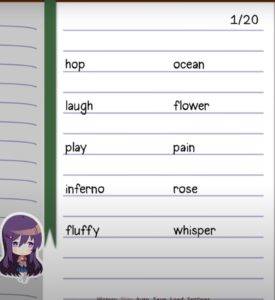I played the game Doki Doki Literature Club. This game is fairly straightforward and free to download. I’ve already played this game before since it was recommended by a TA to our team as it combines elements of cuteness and horror. Doki Doki Literature Club “tricks” players into thinking it’s an anime game combined with dating simulation, but the game slowly transforms into a horror experience as the player progresses.
Playing Doki Doki Literature Club from a feminist perspective involves critically analyzing the representation of its female characters and the narrative dynamics. At first glance, the game appears to be a typical dating simulation set in a high school environment, a genre often critiqued for its reinforcement of stereotypical gender roles and objectification of female characters. However, the game’s horror twist provides an opportunity to subvert these tropes, though it ultimately falls short in significant ways.
Even though Doki Doki Literature Club challenges the traditional anime male narrative by introducing horror elements, it fails to add agency to the female roles. The game challenges the conventional campus anime romance narrative by incorporating horror elements. The mechanics involve clicking through conversations and choosing a specific girl to pursue by creating poems out of selected words that reflect each girl’s style and personality.
However, Doki Doki Literature Club fails to incorporate feminist agency by limiting the depth of the female characters. The girls are portrayed as shallow, and the players have the power to assign characteristics to the poems they create. This dynamic reinforces traditional gender roles rather than subverting them. The female characters are largely defined by their relationships with the male protagonist and their stereotypical traits (e.g., the shy girl, the energetic girl, the mysterious girl). This lack of depth and agency reduces the female characters to mere plot devices rather than fully realized individuals.
One critique I have for Doki Doki Literature Club is that there are way too many conversations, and I can’t skip them! I played for over 90 minutes before something unexpected happened (Sayori’s death). Although the narrative is engaging, the story progresses very slowly. Allowing players to skip conversations would improve the pacing. Intersectional feminism, which considers multiple overlapping social identities and related systems of oppression, is also absent. The characters lack diversity and are not given backgrounds or identities that extend beyond their superficial roles in the narrative.
Additionally, the art design is repetitive, with most characters sharing the same style. This uniformity detracts from the individuality of the characters and could be improved by giving each character a more distinct visual identity.
In conclusion, while Doki Doki Literature Club makes an interesting attempt at blending genres, it falls short in terms of feminist representation.



